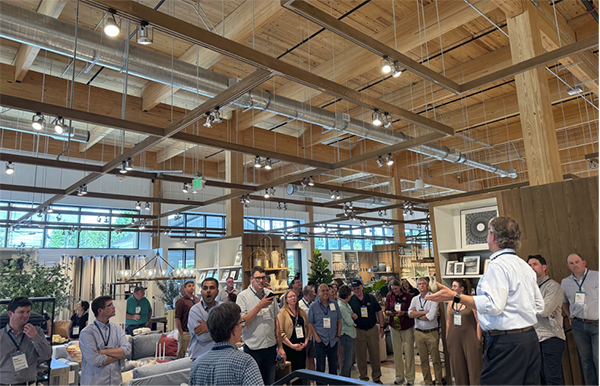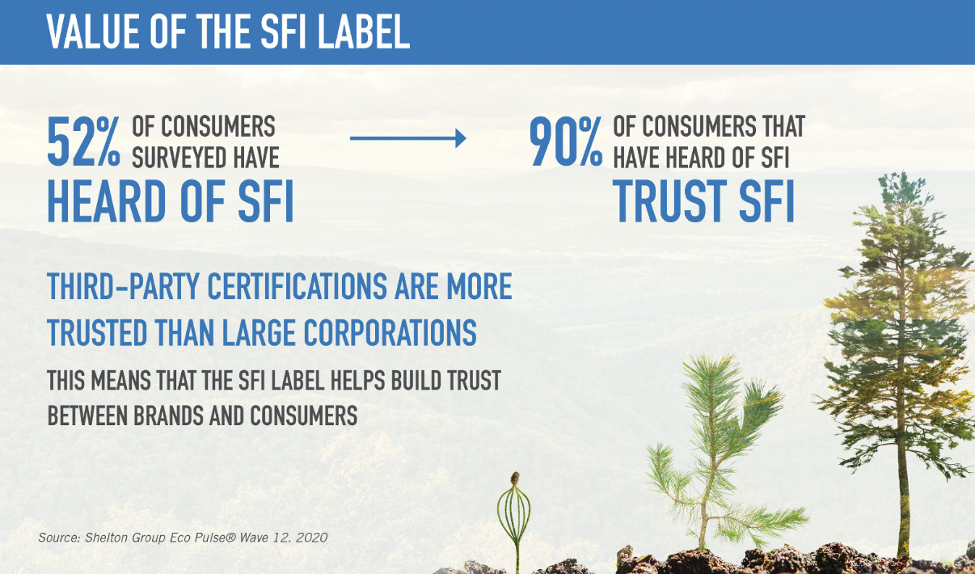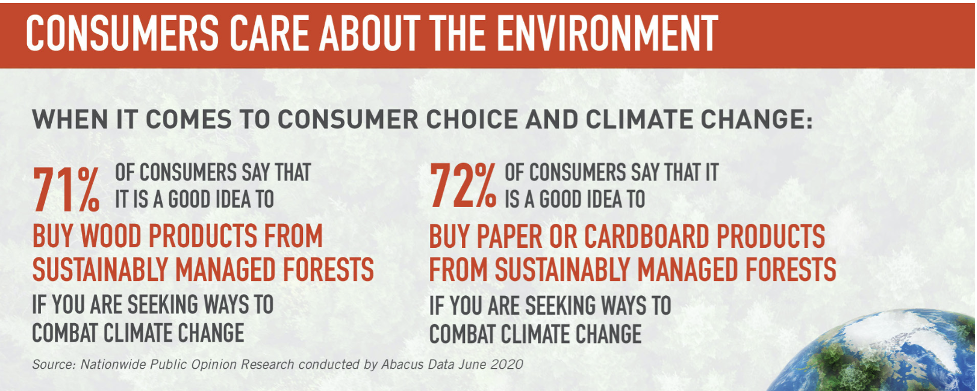By Nick Johnson, Director of Sustainable Supply Chains at SFI
When I walk into a room, I can’t help but scan my surroundings to appreciate how many forest products are on display in various forms around us. From furniture to structural beams and decorative trim, seeing wood used in so many different and practical ways always gives me joy.
In my new role as SFI’s first-ever Director of Sustainable Supply Chains, I’m on a mission to elevate the value of SFI certification in the home and business furnishing sector and advance market recognition. I’m particularly passionate about ensuring that sustainable forestry and the versatile, attractive forest products that are part of our everyday lives get the recognition they deserve. Imagine walking into your favorite furniture store and knowing, with confidence, that the beautiful wooden table you’re considering comes from a sustainably managed, certified forest that generated value for a local community like my hometown of Lakeview, Oregon.

Working with Wood Inspires Me to Motivate Others to Do the Same
As an avid woodworker and furniture maker in my spare time, I know SFI-certified wood is a good choice for furniture making, construction, and renovations because it’s a sustainable, natural, and renewable resource with assurances of its responsible sourcing. The U.S. Green Building Council also recognizes SFI-certified wood through LEED (Leadership in Energy and Environmental Design), the most widely used green building rating system in the world. This means that through the Legal Wood compliance path, you can earn LEED by attributing points to using SFI-certified wood in construction and refitting projects. It’s these kinds of guarantees that consumers and purchasing managers are looking for in the face of today’s supply chain complexities and customer expectations. As global environmental concerns persist, policymakers are increasingly enforcing regulations that prioritize practices that reduce environmental risks and lead to positive benefits.
Helping Navigate the Wood Products Supply Chain
I was pleased to start the onboarding for my new role during the 2024 SFI Annual Conference in Atlanta and have the opportunity to attend sessions focused on global supply chains. I am part of a push to get the word out to manufacturers and retailers that SFI is here to help with tools and solutions for meeting sustainability objectives. My strategic approach to pressing supply chain issues emphasizes forging partnerships across industries to drive innovation and maximize the positive impact of the SFI Forest Management Standard and the SFI Chain-of-Custody Standard.

The 619 Ponce Project in Atlanta features columns, beams, and floors made of local southern yellow pine harvested from forests certified to the SFI Forest Management Standard.
There is also a growing opportunity to engage individual consumers in ways that support sustainable forest supply chains. Research from Shelton Group’s 2020 Eco Pulse shows that over half of consumers are already aware of the SFI label, and of those, 90% trust SFI. I think one of the best ways to build on this high level of awareness is to be proud of our programs and continue making the case for the benefits of sustainable forest management. The more consumers understand that the SFI label identifies wood as coming from a forest that is managed sustainably to ensure many benefits, like mitigating climate change, the more they will choose forest products.

Sustainable Supply Chains Help Keep Forests as Forests
At the heart of my vision is the belief that sustainability and profitability are not mutually exclusive. If people see the value of managing forests sustainably, they will appreciate the value of keeping forests as forests instead of letting them be converted to another use. Sourcing sustainable forest products means maintaining a healthy forest that will continue to purify our air and water, conserve biodiversity, and support local economies.
We also need to keep spreading the word about the specific benefits that SFI standards deliver. Organizations certified to the SFI standards conserve wildlife and water, practice climate-smart forestry, and support relationship-building with Indigenous Peoples. As an example, best management practices (BMPs) have been developed in the U.S. and Canada for timber harvest and forest management operations to ensure water quality is protected, and SFI requires the use of BPMs even if they are considered voluntary in a given jurisdiction. BMPs are recognized as an important tool to protect water quality.
One of my favorite examples to bring up with consumers and companies is the SFI Climate Smart Forestry Objective. This is a game-changer on the landscape, requiring SFI‑certified organizations to address climate change risks to forests and develop adaptation objectives and strategies. Certified organizations are also required to have a program to identify and address GHG emissions associated with forest operations within their operational control. This is so important given the increasing global impact of climate change.
We already know consumers are primed to be receptive to this message—according to a poll conducted by Abacus Data, more than 70% of consumers say wood products from sustainably managed forests are a good choice for combatting climate change. They understand that trees absorb carbon dioxide from the atmosphere as they grow, sequestering and storing carbon while producing oxygen, reducing greenhouse gases, and improving air quality.

Building SFI Recognition Through Sourcing Policies
I’m confident there will be many ways for us to measure the positive impact of SFI’s supply chain work in the months and years ahead. My big hope is that the number of influential companies and organizations that recognize SFI through their sourcing policies keeps growing and that more and more consumers ask for the SFI label.
As a confirmed sustainable supply chain geek, I know these lofty hopes will keep me championing forests in my professional life. I will also carry this optimistic view of the future as I return again and again to explore the diverse forests and ecosystems of remote southeastern Oregon, a beautiful corner of the world that’s my privilege to call home.
Contact Nick Johnson to learn more about the value of SFI certification and supply chain assurances for your organization.
